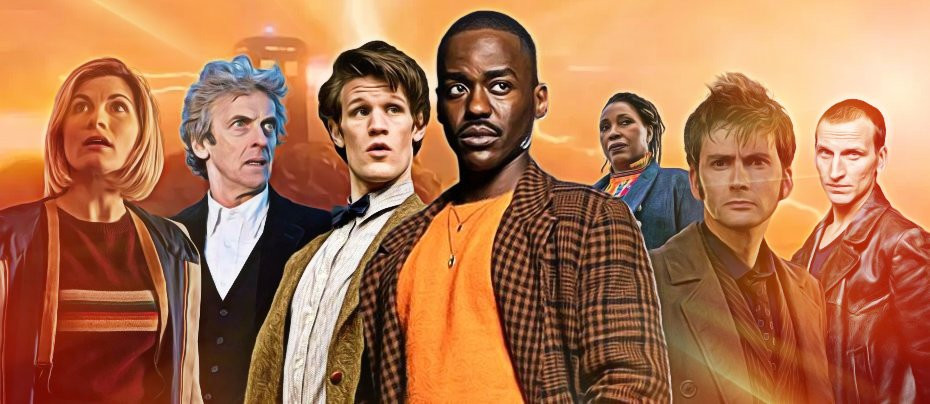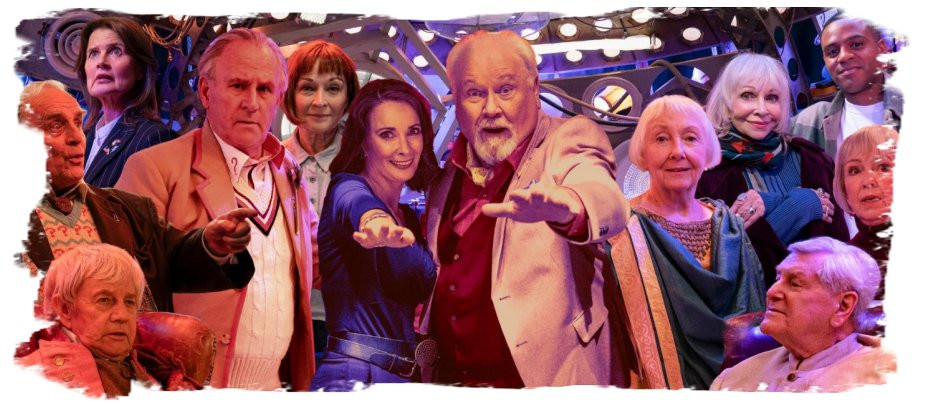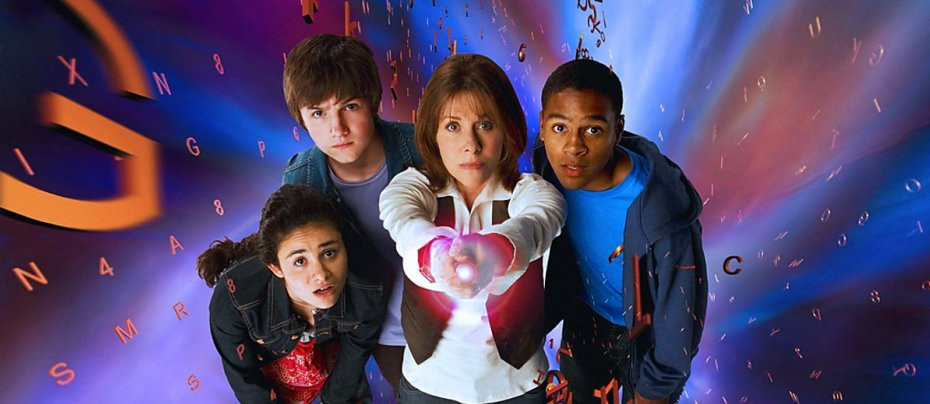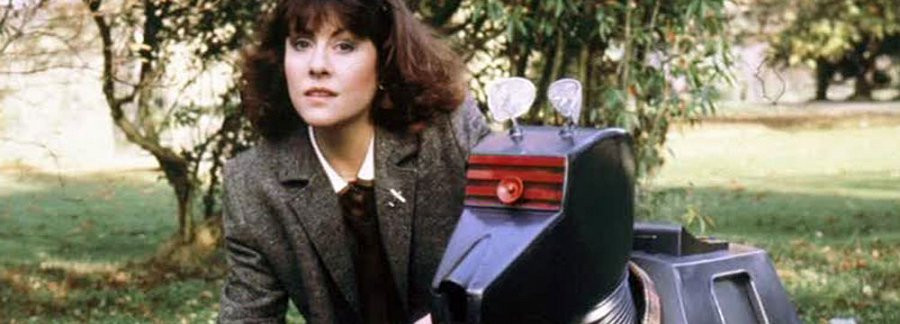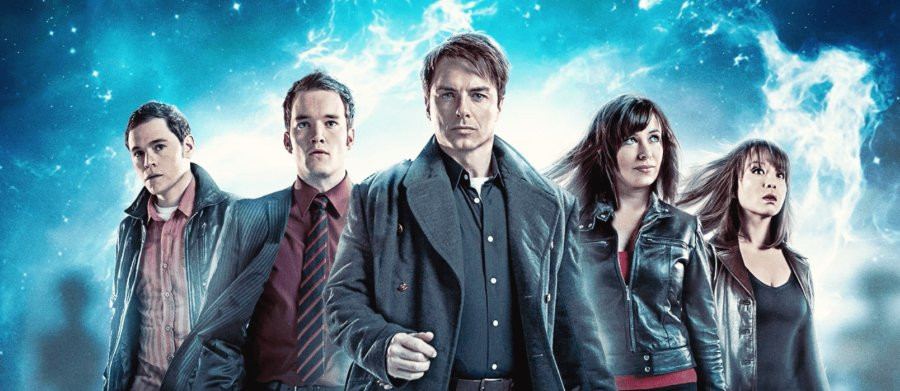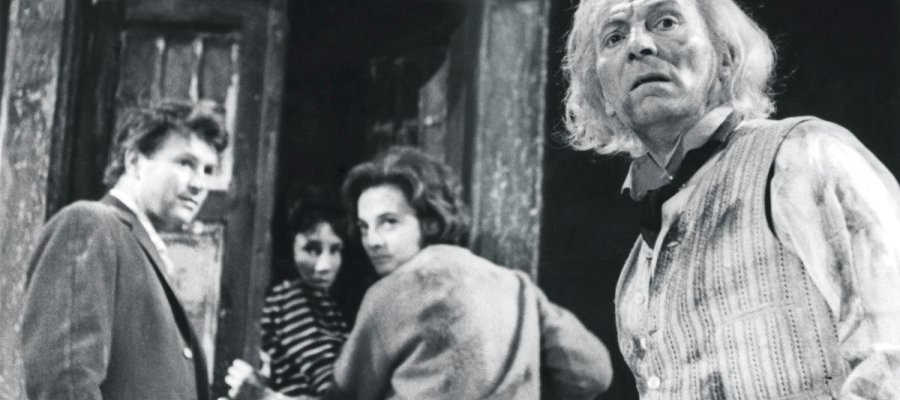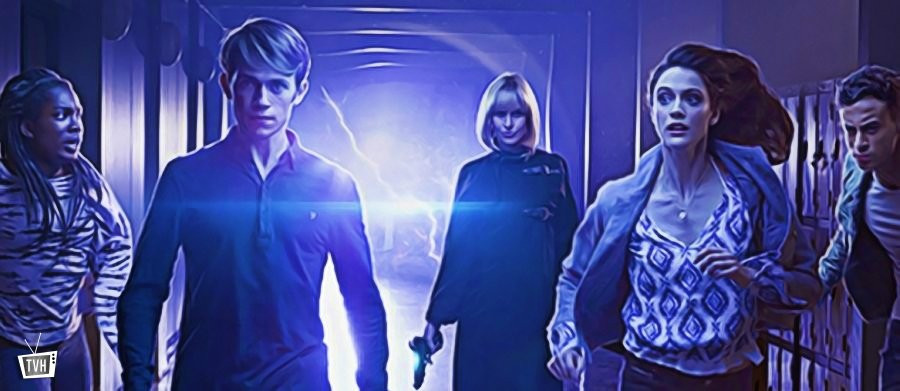The Happiness Patrol
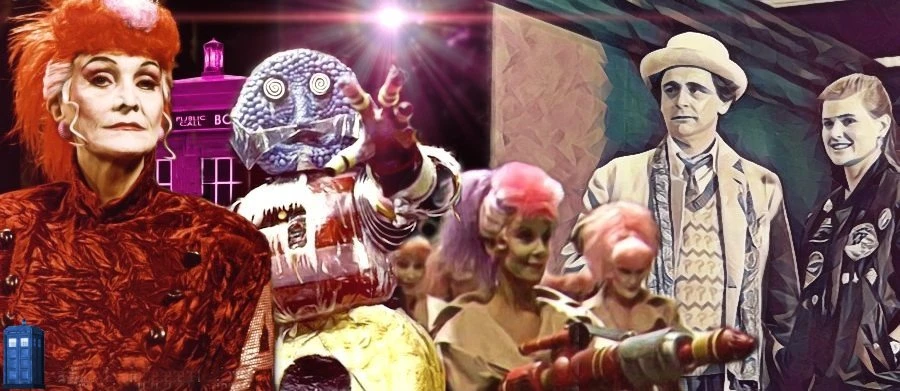
In its twilight years, the original Doctor Who series presented some truly wonderful, bizarre and unique serials. The Seventh Doctor, a peculiar little man with a mysterious agenda, was played by Sylvester McCoy, keeping all manner of secrets under his question-mark pullover. The final three seasons of the programme, broadcast from 1987 to 1989, saw the Doctor engage in a number of proactive missions and included some of the strangest and most imaginative settings in the series' history.
The Happiness Patrol originated as a story idea by script editor Andrew Cartmel (Casualty), given to writer Graeme Curry for his first television credit. Curry crafted a story around the concept of a world where sadness is outlawed on pain of death, and everyone is forced to wear a smile wherever they go. The Doctor and Ace (Sophie Aldred) arrive on the Earth colony of Terra Alpha, to investigate “troubling rumours” about the regime of one Helen A. (Sheila Hancock). The eponymous Happiness Patrol, a platoon of mostly middle-aged women caked in powdery make-up and armed with laser guns, capture or execute anyone suspected of being a “killjoy.” If captured, the unlucky suspect will find themselves competing in a lethal talent show, or worse...
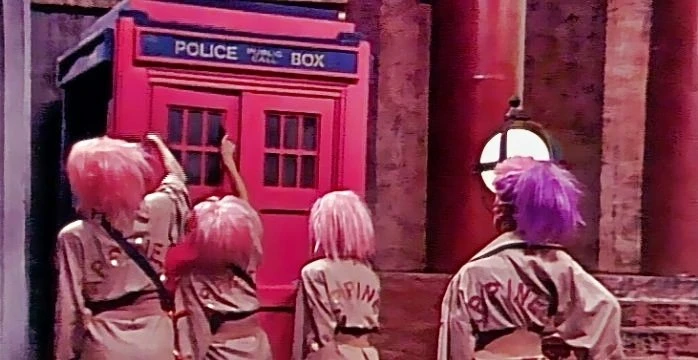
It's an unlikely conceit, of course, but one that lends itself to one of the most creative worlds in Doctor Who's long run. There's definitely a flavour of 2000 AD's peculiar future visions to Terra Alpha, unsurprising given that Cartmel considered the comic required reading for his writers. On the surface, everyone is happy, but the smiles are forced and unconvincing. Pink is the colour of choice on Terra Alpha, from clothes to cars (well, go-karts really). Even the TARDIS gets painted pink by the Patrol. Terra Alpha is, for all its glitz and sparkle, a grim, urban colony, and the decision to have the story occur over a single night makes things suitably atmospheric. The pink and frothy surface of Alphan civilisation hides a dark and dirty underbelly. Native aliens (usually referred to by fans as “the Pipe People”) scratch out a living underground, scurrying through disused pipes that once transported syrup from the sugar factories. Workers march silently through the streets in protest. Listless and unhappy folk are entrapped by undercover officers like Silas P (Jonathan Burn, The Forsyte Saga) for daring to talk about their problems. The Blues are outlawed, naturally.
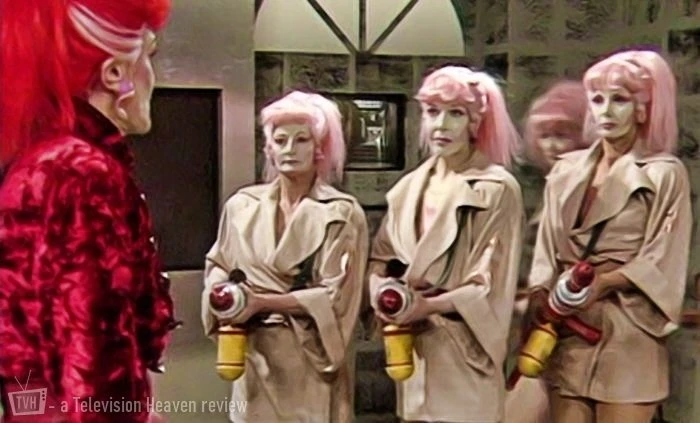
Those who aren't zapped by the Patrol's pink lasers are sent to be executed in a variety of entertaining ways. Some have to perform for their lives (scenes of which were removed from the script due to their similarity with the upcoming, circus-themed serial The Greatest Show in the Galaxy). Others are simply executed on live television in elaborate set-ups (again, something we see little of in the serial itself, and which would have been overly reminiscent of the Colin Baker serial Vengeance on Varos, broadcast three years earlier). The unluckiest find themselves at the mercy of deadly confectionary, including the scalding, strawberry-flavoured Fondant Surprise. These monstrous sweet treats are created by Helen A's chief confectioner/executioner, the Kandy Man, from his Kandy Kitchen.
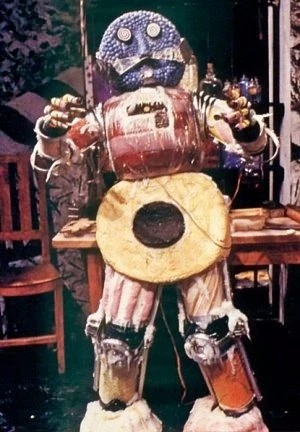
Nothing can really prepare you for your first sight of the Kandy Man. An android constructed from sweets and sugar, the multicoloured monstrosity has sticks of rock for legs, marshmallow feet and a blue, pimply liquorice pill for a head. In spite of the BBC's statements to the contrary, the Kandy Man is very clearly an evil version of Bertie Bassett, leading to legal difficulties with Bassett Foods. Perhaps the showrunners realised they were on sticky ground with this character, and insisted the designer, Dorka Nieradzik, to add a metallic moustache for the robot. Appearing and disappearing between scenes, the 'tache was allegedly designed to hide the human mouth of the actor inside (in spite of this remnant of humanity being the creepiest aspect of the monster). Copyright infringement aside, the Kandy Man is a brilliantly effective and memorable monster, brought to life by David John Pope. The costume was constructed by outside contractor Robert Alsopp, who sadly, as far as I can tell, never earned the nickname “Liquorice Allsopp” for his work.
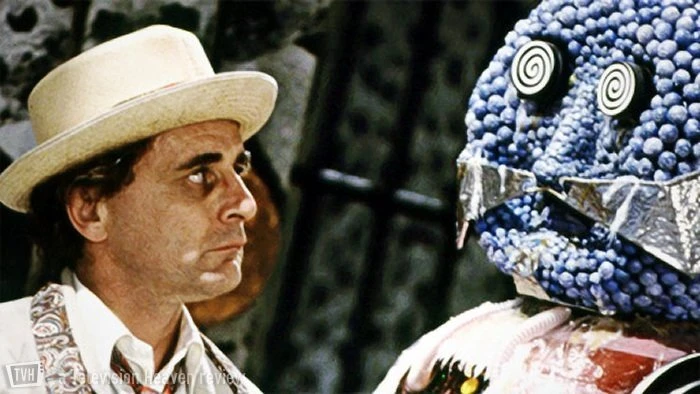
McCoy is on top form in this serial. The best Seventh Doctor stories recognise that McCoy is a showman. In this story he performs some brief but deft acts of physical comedy, and even gets up on stage to croon a few bars of “As Time Goes By...” It's in the quiet, darker moments that he excels though. Indeed, I'd say this serial includes his finest scene as the Doctor, in which he faces down two snipers and talks them into dropping their guns. It's a powerful moment and one that perfectly captures his Doctor's philosophical, persuasive nature. Sophie Aldred (since best known for children's television such as Bob the Builder, Tiny and Crew and Peter Rabbit) is also at her best in this story. Taken into custody by the Happiness Patrol she is “auditioned” for the talent show, laying out her favourite miserable songs (she's a fan of The Smiths, of course) and utterly failing to play the spoons. She builds a friendship with a young, deeply disillusioned Patroller named Susan Q, a beautiful performance by Lesley Dunlop. She'd done this before, in 1984's Peter Davison serial Frontios, but is best known now for Where the Heart Is and May to December.
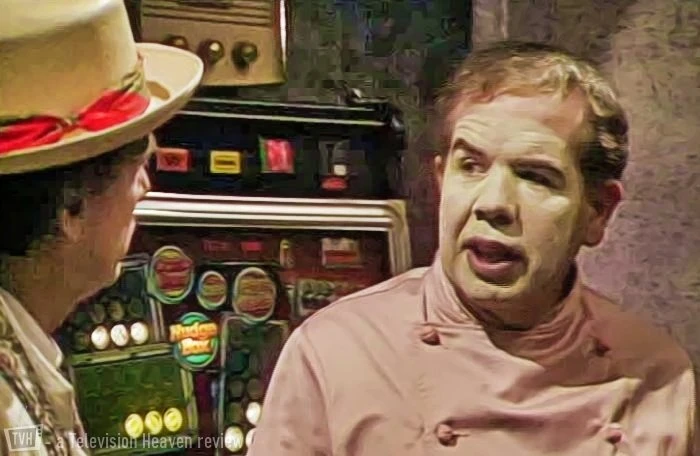
Indeed, it's a strong cast throughout the serial. Georgina Hale (Budgie, as well as Ken Russell's The Devils and The Boyfriend) and Rachel Bell (Dear John, The Darling Buds of May) play rival Happiness Patrollers Daisy K and Priscilla P, both sour-faced seniors who can barely keep their false smiles on their faces. In fact, there are a remarkable number of people who can get away with being miserable old sods on Terra Alpha, but then, ruling regimes are well-known for their hypocrisy when it comes to their own behaviour. The wonderfully sullen Tim Barker (Peterloo) is most memorable as former head joke-writer Harold V, who's fallen from favour and will no doubt be on the wrong end of a fun gun if he doesn't cheer up. Another returnee from the Davison era, John Normington (The Caves of Androzani) is memorably officious as Trevor Sigma, who's come in from Galactic Central to complete a census, although his technique of wandering the streets asking everyone what planet they're from seems like a rather arduous way of going about it. All aliens are given the designation “Sigma,” including Richard D. Sharp as galactic gap year student and Blues musician Earl Sigma. Every serial in Doctor Who's twenty-fifth season includes a single actor of colour, and in three of them, they're performing “black” music. While intended to be progressive, seen now it smacks of tokenism, but at least Sharp's miming of the harmonica is better than the god-awful kid's TV rap that we got in The Greatest Show in the Galaxy.
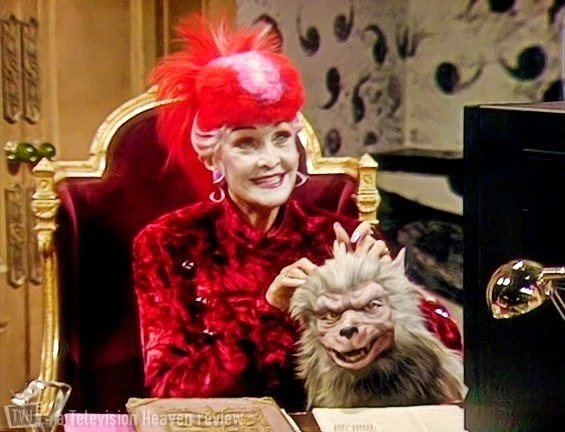
Over the years, fans and commentators have read various deeper meanings into The Happiness Patrol. Cartmel and Curry intended the story as an allegory of Thatcherism, with Helen A. intended as a parody of Thatcher, something Hancock enthusiastically embraced. “I hate Margaret Thatcher with a deep and venomous passion,” said Hancock in an interview with Doctor Who Magazine in 2001. It's a miracle the interview even happened; Hancock normally hates anyone even mentioning she was on Doctor Who. One of our finest actors, known for productions as diverse as The Boy in the Striped Pyjamas, The Buccaneers, The Brighton Belles and Now, Take My Wife, Hancock is electrifying as the happiness-obsessed Helen A, brittle and furious whenever provoked. While she plays the character with Thatcher's weirdly positive attitude towards the catastrophic, there's not really anything in her policies that's anything like Thatcher's. Even the marches by sugar factory workers don't quite work as an allegory; if it were Thatcherism, she'd be shutting the factories down. No, if anything, the “routine disappearances” smack of Thatcher's old friend General Augusto Pinochet.
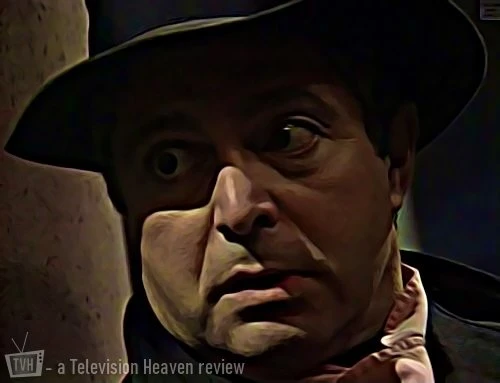
Really, though, this story is about any such regime that oppresses a group of people it disapproves of. A number of critics have read the story as a gay rights parable. In The Discontinuity Guide, Paul Cornell, Keith Topping and Martin Day considered Silas P's actions as essentially entrapping people over cottaging and suggests that the victim of the Fondant Surprise wore a pink triangle. He doesn't, but it's an easy mistake to make, given the sheer prevalence of pink in the serial. The gay rights angle, though, is certainly one with some validity. Section 28 had been made law just months earlier in 1988, prohibiting any local authorities “promoting” homosexuality, and stopped schools from presenting non-heterosexual relationships as valid. The amendment called such things “pretended family relationships,” and there's certainly a streak of Thatcher's espousal of family values in Helen A's presentation. It's all good, old-fashioned happy families on Terra Alpha, at least on the surface. Notably, Helen A's husband Joseph C, a perpetually sloshed parody of Dennis Thatcher played by the great Ronald Fraser (Spooner's Patch, The Practice, Too Late the Hero), ends the serial running away with the Kandy Man's creator, Gilbert M (Harold Innocent, best known as the amoral bishop in Robin Hood: Prince of Thieves). The sullen marches of the protestors could even be seen as a parodic inversion of Pride marches, with people in dismal grey costumes parading through a colourful camp society.
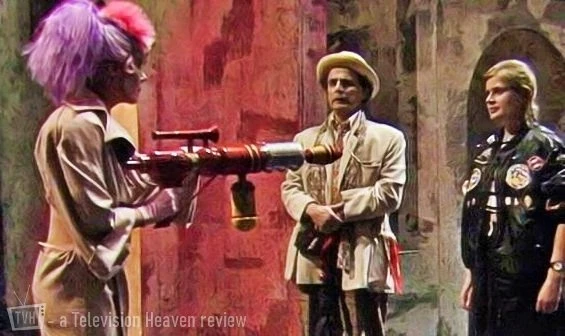
For many of us, though, The Happiness Patrol is a story about depression. Those of us who suffer from such mental illnesses are used to having to put on a happy mask to go about our day-to-day business. So it is with the Alphans, who are forced to wear a smile at all times on pain of arrest or worse, and who wear literal masks of garish make-up as a matter of course. A society where the superficial is all that matters, and no one can talk about their real emotions, can seem painfully like real life for many people. How many of us have just wished we could banish our negative emotions? But as the Doctor himself says at the story's close, “Happiness means nothing unless it exists side-by-side with sadness.” It's a perfect story for a Doctor whose clowning behaviour covers a melancholy soul, and whose comical appearance, down to his punctuation-covered pullover, disguises an ancient, all-knowing alien. Terra Alpha's society is almost a metaphor for the Doctor himself, with darker depths beneath the cheerful surface. It's almost as good a metaphor for the series itself in this period. In spite of the painfully cheap, kids' TV production and stylings, Doctor Who in this era presented stories that hid serious, intelligent themes beneath their silliness. The Happiness Patrol is one of the finest examples of the programme's overlooked latter years.
Review by Daniel Tessier


